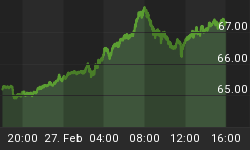From all accounts it appears that the world is in the early stages of a major leg up in food prices. The major macroeconomic trend will likely drive economic policy and the investment outlook for years to come. Although mainstream pundits like to focus on cyclical drivers like the weather, the real force behind the move is secular. The U.S. is leading the world in a pandemic of monetary inflation that is helping to cause commodity prices, food in particular, to skyrocket across the globe.
The Federal Reserve's monetary excess is currently being magnified by China's misguided currency peg policy. As the United States debases its currency through excess printing, China must follow suit. In order to maintain a consistent relative valuation, China must adopt the monetary policy of the United States.
Just last week, China announced that in the 4th Quarter 2010 its foreign currency reserves leapt by $199 billion to $2.85 trillion. The increase was much larger than economists expected, and suggests that China is printing as much as $2 billion worth of RMB per day in order to buy dollars to maintain the peg. The big problem is that China, with a booming economy, is adopting a monetary policy of an economy that is contracting. This is the perfect recipe for inflation.
And it's not just China that is enforcing a currency peg. Many other countries intervene in the forex market when they feel their currency has risen too high against the greenback.
For example, the Chilean currency gained 17% in value against the USD in just 7 months during 2010. The surging currency underscored the country's status as an emerging markets success story. But that condition abruptly ended last week when Chile's central bank pledged to intervene in the local currency market by increasing foreign currency reserves by $12 billion in 2011. After the announcement, the currency predictably dropped against the dollar and caused a major sell-off in Chilean equities.
The specious idea behind this action is that foreign governments believe that by keeping their currencies cheap they can bolster exports and maintain a strong economy. But a rising currency does not necessarily restrain exports. If those countries currently committed to pegs were to reverse course, their problems with local inflation could diminish. And those lower prices could offset to a certain degree the decreasing purchasing power experienced by the importers of those countries' domestic goods.
For the remainder of this article, plus a more detailed analysis of China's inflation problem by Peter Schiff and articles on other investment topics, please see the latest edition of Euro Pacific's The Global Investor Newsletter.
For in-depth analysis of this and other investment topics, subscribe to Euro Pacific's Global Investor Newsletter. Click here for your free subscription.
Click here for free access to Euro Pacific's new special report: What's Ahead for Canadian Energy Trusts?
Be sure to pick up a copy of Peter Schiff's hit economic fable, How an Economy Grows and Why It Crashes.















